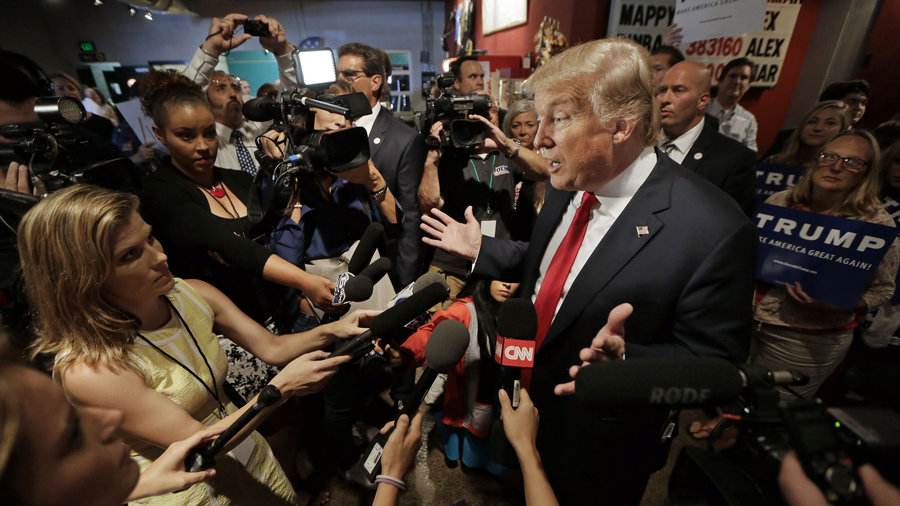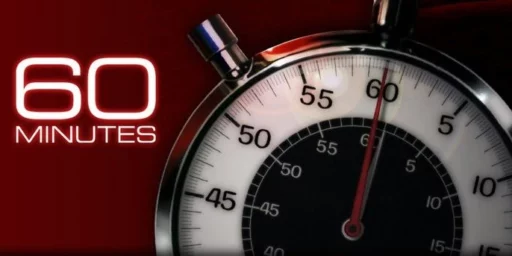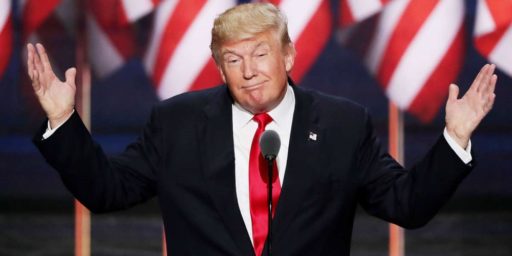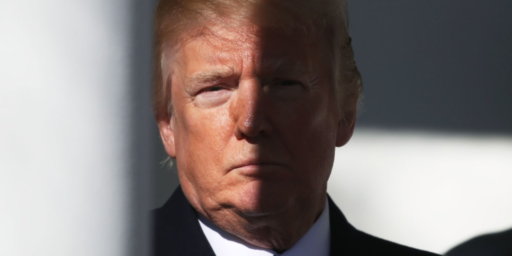The Cynical Truth Behind Trump’s Attacks On The News Media
The President's constant attacks on the news media are meant for a single purpose, to undermine even accurate reporting about wrongdoing in his Administration.

In an interview last week, 60 Minutes correspondent and longtime reporter Lesley Stahl revealed something interesting about President Trump and his history of attacks on the news media:
One of the foremost broadcast reporters in the country said this week that President Trump admitted to her that his relentless attacks on the press was a strategy to discredit reporters and news media organizations to shield himself from negative coverage.
Lesley Stahl, the 13-time Emmy award-winning ”60 Minutes” correspondent whose work has spanned decades, made the disclosure on Monday during an interview with Judy Woodruff of “PBS NewsHour” at a journalism award presentation in New York.
At the Deadline Club Awards presentation, Woodruff asked Stahl about her November 2016 interview with Trump — his first after the election victory. Stahl described going to meet with him at Trump Tower before the interview, along with one of her bosses, whom she did not name. After Trump began to unload on the news media, she said, she asked him whether he planned to stop attacking the press — a hallmark of his campaign — now that he had been elected.
“I said, you know that is getting tired, why are you doing this — you’re doing it over and over and it’s boring,” Stahl said. “He said you know why I do it? I do it to discredit you all and demean you all, so when you write negative stories about me no one will believe you.”
Stahl’s striking anecdote fell into a silent moment in the room. Woodruff shook her head.
“He said that,” Stahl said, raising her eyebrows. “So put that in your head for a minute.”
(…)
Trump’s belligerence toward the news media, which he lambastes as “fake news,” and journalists, whom he often calls “dishonest,” have continued to be an integral part of his presidency, part of a habit of attacking critics and other institutions that act as potential checks on his power.
The broadsides have been mimicked by politicians and others running for elected office around the country, and parroted by foreign leaders around the world, many with poor human rights records and reputations. The wife of Alabama judge and failed Republican Senate candidate Roy Moore described The Washington Post’s reporting on sexual misconduct allegations against Moore as “fake news,” for example.
Trump has falsely claimed credit for the phrase, which he called the “one of the greatest of all terms I’ve come up with” — one of more than 3,000 false or misleading claims he has made as President according to a running tally compiled by The Post’s Fact Checker column. The term had previously been used to describe phony stories that had gained traction on Facebook during the election year.
Here’s the video of Stahl’s comments:
The video starts at the point where she was asked the question about Trump, but the entire thing, which runs just over 30 minutes is worth watching for the insights that Stahl and Judy Woodruff provide about what it has been like to be part of the media for the past thirty years or more, and their experiences covering past President’s in particular.
The latest iteration of the President’s attack on the media can be seen in his Twitter feed just this morning:
The Fake Mainstream Media has, from the time I announced I was running for President, run the most highly sophisticated & dishonest Disinformation Campaign in the history of politics. No matter how well WE do, they find fault. But the forgotten men & women WON, I’m President!
— Donald J. Trump (@realDonaldTrump) May 29, 2018
Trump’s history of attacking the media predates his time as a political candidate. Dating as far back as the 1980s when he first started become the media celebrity he eventually became, Trump would attack reporters and news outlets that reported things that portrayed him in a bad light or which reported on things that he didn’t like. On more than one occasion, for example, he threatened to sue reporters or business publications that called the claims he made about his wealth into question, or which reported that his actual net worth was below what he claimed it was at a given point in time. Most of these threats were never followed through with, of course, and in each of the cases, it was apparent that the news organization in question had a valid basis for the estimates of Trump’s wealth that they were reporting. Nonetheless, the precedent that Trump set back then was obvious. His public image and the mirage of his immense wealth were something that he viewed as being very important, and he would consistently lash out at anyone who contradicted his claims. This pattern remained consistent in the intervening decades, and it’s a script that he’s followed since bursting on the political scene.
Beginning early on in his campaign Trump repeatedly attacks reporters and news organizations that he deemed to be insufficiently obsequious to him or his campaign. These attacks took the form of both banal and empty rhetoric to far more serious attacks on individual reporters. During many of his campaign speeches, for example, Trump would often make the false claim that the cable networks that were routinely following him from campaign stop to campaign stop had “turned off” their cameras even as that same speech was being broadcast live and without commercial interruption. During these speeches, he would repeatedly refer to the media in general and individual reporters particularly in a derogatory manner and encouraged the crowd to turn on the reporters and camera crews covering the events. As several of the reporters who followed Trump around back in those days noted, this would often result in the crowd shouting vile epithets at reporters to the point that they would need to be escorted out of the venue by local law enforcement for their own safety. Several times during the course of the campaign, the Trump campaign banned reporters from covering events because of critical reporting or based on things published on the Editorial or Op-Ed pages of a newspaper. This happened even to reporters from such publications such as The Des Moines Register and The Washington Post, both of which found that their reporters were denied press passes to cover certain events. On another occasion, he had Univision anchor Jorge Ramos physically removed from a press conference when he asked a question about Trump’s position on immigration. Later during the campaign, Trump suggested that the nation strengthen its libel laws in ways that would clearly violate the First Amendment. This rhetoric continued throughout Trump’s campaign right up until Election Day in 2016.
The pattern of attacking the media in this fashion, but it has taken on a far more sinister tone now that he is essentially the most powerful person in the country. Within a month after taking office, for example, Trump called the news media the “enemy of the people” for the first time, a phrase he has returned to several times over the past sixteen months. Last summer, one of his close advisers suggested that the media should be criminally charged for publishing leaked information even when that information isn’t classified. During a campaign rally style speech in Arizona last August, Trump upped his rhetoric by referring to members of the media as “sick people” who “don’t like our country,” and who are “trying to take away our history and our heritage.” That last part, of course, was a reference to the negative coverage that Trump received in the wake of his remarks about the deadly protest in Charlottesville, Virginia. In October, he took to Twitter to threaten NBC with unspecified government action including pulling their broadcast license notwithstanding the fact that broadcast licenses are issued to individual stations, not networks, and that the FCC has no similar licensing requirement for cable networks such as MSNBC. Earlier this year, the President directed his private attorneys to send a “cease and desist” letter to the author and publisher of a book critical of the Trump White House and once again brought up the possibility of strengthening the nation’s libel laws in response to the negative coverage his Administration was receiving. Throughout it all, the President has frequently referred to so-called “fake news,” a label that he applies quite regularly to anything having to do with the Russia investigation among other matters. That label has been picked up by his supporters and sycophants, who are quick to label any news item they don’t like as “Fake News.” Earlier this month, the President admitted the already blindingly obvious when he said that when he refers to “Fake News” he means any news coverage that is critical of him or his Administration regardless of whether it’s true or not.
Stahl’s revelation merely adds another piece to the puzzle of what’s behind the President’s disdain for the media, and it’s one that makes those attacks arguably even more concerning than they already were. What the President is doing here is really a two-pronged approach, one that’s aimed at his base and another aimed at the public as a whole. With respect to his base, Trump’s attacks on the media are clearly meant to appeal to the long-standing conservative paranoia regarding a “biased media,” an attack that has become irrelevant in the age of cable news and the Internet, and most specifically with regard to the existence of Fox News Channel, which, with the exception of people who can be counted on one hand, has become nothing but a propaganda network for the Trump Administration. The second prong of the approach that Trump revealed to Stahl is own that’s aimed beyond his own base to the public as a whole. Essentially, he is engaging in a strategy designed to undermine the credibility of the media with the public as a whole, with the idea when negative news about him and his Administration is made public, people will be less inclined to believe it because they’ve been drowned in so much misinformation that it’s hard to tell what’s true anymore. This is especially true, I think, for people who don’t pay as much attention to news and politics as those of us who are immersed in it on a regular basis.
It is, of course, a cynical game on Trump’s part, but it’s, unfortunately, one that seems to be working. Among Trump’s supporters, for example, there’s no question that his tirades against the media have served exactly the purpose that he wants them to. These attacks are, of course, gleefully and obsequiously repeated by his sycophantic supporters on Fox News Channel and elsewhere, who are of course members of the very same media Trump attacks, which only helps to reinforce that message. One example of this can be seen in the fact that a poll released just about a month ago showed that half of the people who identified themselves as Republicans agree with the President’s characterization of the press as an enemy of the people, a phrase, of course, that has its origins in the rhetoric of Josef Stalin. More generally, other polling has found that Americans as a whole have lost confidence in the mass media and the extent to which it can be relied on to accurately report the news. While this continues a trend that predates Trump, it’s quite likely the case that the President’s attacks are not helping in that regard.
All of this places the disdain that the President has shown for press freedom and for the job that journalists do in an interesting perspective, and raises serious concerns about what happens if he succeeds in continuing to undermine trust in the media. Previous Presidents often clashed with reporters, of course, but none of them, not even Richard Nixon whose paranoia regarding the media became well-known after the release of the tapes of his conversations in the Oval Office, have treated the media in the manner that this President and his Administration do. Reporters often complained, rightfully, about the lack of transparency from previous Administration, or about things such as the actions that the Obama Administration took in investigating reporters who reporter information that had been leaked to them by White House insiders. Compared to this White House, though, those previous Administrations were remarkably open to the press, were respectful to reporters rather than attacking them as if they were political enemies, and at least made an effort to maintain good relationships with reporters. All of that has been thrown out the window by the Trump Administration, which has been openly hostile to reporters and news organizations with the exception, of course of Fox News Channel, which appears to be the President’s chief source of information on a daily basis.
As I’ve said before, Trump’s anti-media rhetoric has crossed a line and there’s only one right side to be on:
These are the words of an authoritarian dictator, not the words of the leader of a republic with a Constitution where freedom of speech and of the press are not only enshrined in our Constitution but are also the very lifeblood of American democracy. The fact that it has been reported that the Trump Administration had multiple contacts with Russia during the campaign is most certainly real news, especially in light of what we already know about Russian hacking and apparent efforts to influence the election itself apparently in Trump’s favor. At the very least, these allegations need to be investigated both by law enforcement and by Congress in a fair and efficient manner. If it weren’t for someone reporting this, we wouldn’t know about it. Just like if it weren’t for reporters we wouldn’t have known about Watergate, or Iran-Contra, or the reports that Hillary Clinton was taking the extraordinary step of using a private email server while Secretary of State. All of these stories were broken first by what the so-called President is calling the “fake” news media.” This is why I agree with Thomas Jefferson. Given the choice between government without newspapers and newspapers without government, I will choose the latter. In reality, of course, we don’t want to live in either a world where there is no government or one where there are no newspapers (i.e., news media). They are both essential to the survival of a free society, but as long as we have government, we need a free and independent media that isn’t being intimidated by a wannabe dictator in the White House. There are two sides in this war between Trump and the media, but only one of them is the right side.
Either you’re playing along with Trump’s cynical game, or you’re fighting against him. There is no possibility of neutrality in this battle.





This is no Trump innovation, this has been Republican policy for a long time. There is not a Rush Limbaugh show that goes by that has no attacks on the demonized “MSM” for example.
Just another way Trump is the current culmination of where the GOP has been heading.
Trump would have not ever been possible without the preexisting Conservative Infotainment Media Bubble – which has indoctrinated many of his supporters to being literally unreachable.
The problem with all of this is that ~40% of the nation believes his bullshit as though it were gospel.
Sane, rational people can see what is happening, yet no one is pushing back effectively. No one is has a solution; no one knows how to fight back against this maelstrom of mendacity.
Left unsaid is why the so-called liberal media sat on this for 18 months, rather than making this known when it was originally said (before the inauguration).
In the future, historians will wonder at the damage done to crucial institutions for such banal a reason as one man’s vanity and incompetence. And as much as they’ll blame Trump, they will also rightly blame us.
Really, this is just a continuation of the last post about Giuliani. Trump and his toadies know that his supporters are not likely to even see these stories, and if they do they certainly won’t believe them. So all they are doing essentially is bragging. They are telling the world openly what they are doing. The tone of these stories wouldn’t change if Trump or Giuliani laughed and said “I can’t believe this is working”.
@Pete S:
Trump said it best himself, didn’t he? He could shoot someone on Fifth Avenue and his fans wouldn’t care.
Uh…if Trump said this on-the-record to a reporter in November 2016, why didn’t Stahl include his quote in the broadcast story? Why didn’t she pepper him with follow-up questions?
I guess it was all part of Les Moonves’s ‘Trump might be awful for the country, but he’s great for ratings’ strategy to not report what the President-elect said on-the-record?
@Timothy Watson:
Stahl probably wanted to keep her access to Trump. And he said it off-camera, so technically it wasn’t on the record.
The Fake Mainstream Media has, from the time I announced I was running for President, run the most highly sophisticated & dishonest Disinformation Campaign in the history of politics. No matter how well WE do, they find fault.
President Pud
“It is the press, above all, which wages a positively fanatical and slanderous struggle, tearing down everything which can be regarded as a support of national independence, cultural elevation, and the economic independence of the nation.”
― Adolf Hitler, Mein Kampf
@Mister Bluster:
Wasn’t Trump supposed to have kept a copy of Mein Kampf as his bedtime reading matter?
@CSK: Generally, anything said to a reporter is on-the-record unless it’s explicitly off-the-record or background.
And if it was off-the-record, why is it now okay for Stahl to disclose it?
I think you’re closer to the point on the access point however. And not just her access, but all of CBS’s, which is why I regularly point out the codependent relationship between Trump and the media.
The media and reporters aren’t the victims here, the country and the American people are.
Slightly OT, but Roseanne Barr’s show supposedly was just cancelled by ABC.
I expect The Usual Suspects to blame this on a) Soros b) Hillary Clinton c) the aliens living in Area 51.
Yep, I can’t imagine why Donald Trump would be attacking the media.
http://thefederalist.com/2018/05/28/media-double-down-after-new-york-times-gets-busted-peddling-fake-news/
It’s a complete mystery.
https://www.nationalreview.com/2018/05/illegal-immigration-enforcement-separating-kids-at-border/
I can’t imagine why anyone would ever do such a thing.
https://www.redstate.com/streiff/2018/05/29/daily-beast-launches-twitter-followers-hit-girl-attack-elon-musk/
It’s not like there are any persistent and chronic problems of media behavior in America, like almost completely ignoring the economic implosion of a major South American nation.
https://twitter.com/steve_hanke/status/1001482798094430208
Nope. It’s all just some malevolent trickeration from Donald Trump.
Mike
@Kathy: Future historians will be looking back at the entire Trump era and saying “What the holy f*ck?”
@Mister Bluster: I’ll mention it again, but there are eerie parallels between the Trump use of the term “fake news” and the Nazi use of the expression “Lügenpresse” (lying press), which was revived by some Trump supporters in 2016.
I was thinking of linking to the Wikipedia article on the term (there is one), but I just found an interesting WaPo article on the subject from Oct. 2016, several months before the Trumpists adopted the term “fake news.” According to the article:
https://www.washingtonpost.com/news/worldviews/wp/2016/10/24/the-ugly-history-of-luegenpresse-a-nazi-slur-shouted-at-a-trump-rally/
This is hardly the first example of Trumpist rhetoric that has its origins in language once used by supporters of Adolf Hitler. The phrase “America First” was in heavy use by anti-Semitic isolationists in America during WWII, most famously the America First Committee, represented by a certain Charles Lindbergh. Later on, it continued as a rallying cry of the Klan and other racist groups.
The fact that both these expressions predated their pro-Nazi use doesn’t change the fact that they (like the swastika) came to be primarily associated with the Nazis and other racist extremists.
@Kylopod:
Maybe that, too. I’m of the opinion barbara Tuchman asked that question for her book “The March of Folly.”
I heard a metaphor once comparing history to a blackboard. Imagine you have a very big blackboard covered in writing. If you were very close, you can make out the writing easily, but can only see a small piece. As you back away, more of the writing enters your field of view, but it’s harder to read.
I find it very apt. When you’re in the midst of things, like right now, there’s much you don’t know and can’t know (ie what does Mueller have on Trump, if anything?). As time passes, there’s more information, but it’s less clear. Even if you have records, much of the context, and much more of the feel, of the time won’t be available.
@MBunge: Trump doesn’t care about truth. And you’re his enabler.
I agree that Trump has been heavy handed and too sharp in his criticism of the media. He needs to cool it. For the past several years I have sadly watched the professionalism, credibility, and integrity of the news media decline. I was raised watching Conkrite and Brinkley. We watched news for facts, not the propaganda and opinions that we are fed now by these people who for some reason talk loud. The commentators of some the network news programs spend their time hollering and berating people. I used to watch Matthews, but he is now too loud.
Print journalism is gone for good. There are some reasons for that. The internet, social media, changing lifestyles ( people used to have the newspaper and breakfast together – a daily habit).
People no longer trust the news media like they used to. I turned the main news networks off after growing tired of 24/7 coverage of them hollering and screaming at Trump, with a few minutes here and there of other news.
I could hardly find much mention and live news reports of the Hawaii volcano disaster. CNN did pretty good on this, but that was it. I had to go to other sources including some science and school news sites (Channel One) to find good coverage. I use a variety of sources now for news.
Too often the news people seem to think they not just give the facts, but also that the people must accept and agree with their opinions. The news people of today would not even be allowed on the network parking lots years ago.
“And that’s the way it is”